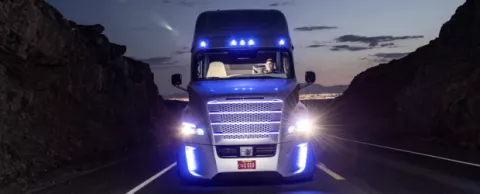
The future of self-driving commercial vehicles is unclear, but the lure of fewer accidents, reduced fuel costs – not to mention less human error – have generated excitement in the trucking industry as well as the transportation safety sector.
The Daimler Inspiration Truck will be tested rigorously on Nevada roads as the company gathers data about the truck’s performance and adds improvements as needed, according to a New Scientist article. Daimler is the parent company of Council Lead Partner Mercedes-Benz, which also is working on next-generation vehicles, including hybrid electrics intended for city use.
What’s different about Daimler’s truck?
Self-driving work rigs are not new. You can see them on farms in the form of grain harvesters and planters; and mining operations use them too. But those vehicles aren't designed to operate alongside other cars and trucks on the highway. The Inspiration Truck has been licensed by the state of Nevada to do just that – share the roads.
Autonomous trucks could provide several advantages for the trucking industry. They could dramatically reduce the chance for human error, which is said to cause the great majority of accidents. The savings in fuel costs would come from the truck's ability to accelerate and decelerate more gradually than humans normally do. Also, they would be well-suited to convoys because they would be able to communicate with each other.
Patrick Vogel of the Free University in Berlin, Germany, was quoted as saying: “A car never gets tired. It doesn't have any emotions when it's driving home from a breakup with its girlfriend. It doesn't get drunk or old and slow."
The combination of a camera that interprets lane markings and monitors to locate other vehicles on the road enables the Inspiration Trucks to remain in their lane, speed up and slow down to prevent collisions.
To be clear, the Inspiration Truck is not quite ‘driverless.’ There is a human driver on board ready to make lane changes or deal with unexpected situations.
Unanswered questions
There are issues to be worked out too:
- Drivers could come to rely on the autonomous vehicles too much or attempt to use them in unintended ways, which could prompt safety concerns
- No one seems to know yet how insurance companies would treat and cover them
- The possible impact on driving jobs in the trucking industry and businesses like motels and trucks stops is unknown
- And, if there is a highway accident, who or what takes the blame?
As Peter Stone, a University of Texas computer scientist put it, “Before it became clear that the technical issues could be addressed, these were academic questions. Now, they’ve become very real questions.”
###
Doug Peeples is a Portland, Oregon-based writer specializing in technology and energy. Follow @smartccouncil on Twitter.
Related articles…
Mercedes-Benz F 015 Luxury in Motion Research Vehicle World Premiere (video)
Mercedes-Benz rolling out a lineup of city-friendly hybrid EVs



